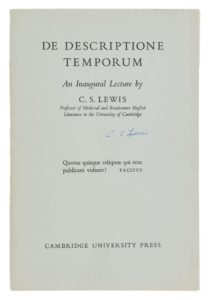C. S. Lewis exchanged Oxford for Cambridge in 1955. He never received the recognition he deserved at Oxford; Cambridge offered him a special professorial chair designed with him in mind. It was a major event when he gave his inaugural Cambridge lecture, speaking to a full house about the distinctions between the ancient and the modern.
 It’s in that lecture, De Descriptione Temporum,” that he made his oft-quoted comment about being a dinosaur because he was an Old Western Man, a type he claimed would not be around much longer.
It’s in that lecture, De Descriptione Temporum,” that he made his oft-quoted comment about being a dinosaur because he was an Old Western Man, a type he claimed would not be around much longer.
Another passage in that lecture that is well worth contemplating is the part where he critiques the idea that just because something is new it must naturally be better.
“How has it come about,” he queried, “that we use the highly emotive word ‘stagnation,’ with all its malodorous and malarial overtones, for what other ages would have called ‘permanence'”? He continued,
Why does the word “primitive” at once suggest to us clumsiness, inefficiency, barbarity? When our ancestors talked of the primitive church or the primitive purity of our constitution they meant nothing of that sort. . . . Why does “latest” in advertisements mean “best”?
Acceptance of Darwinian evolutionism as applied to all aspects of society was one answer, he affirmed. We are all supposedly evolving and getting better all the time. But along with that, the coming of the age of the machines helps explain it more fully.
It is the image of old machines being superseded by new and better ones. For in the world of machines the new most often really is better and the primitive really is the clumsy. And this image, potent in all our minds, reigns almost without rival in the minds of the uneducated.
Technological improvements, Lewis opined, become milestones in people’s lives. He used examples from his day: the development from an old push-bike to a motorbike to a car; from gramophone to radio to television. Today, we can use other examples: the latest I-Phone simply must be purchased because it’s so much better.
 This way of looking at things—this approach to life—has left “footprints on our language,” Lewis asserted, and is the very thing “that separates us most sharply from our ancestors and whose absence would strike us as most alien if we could return to their world.”
This way of looking at things—this approach to life—has left “footprints on our language,” Lewis asserted, and is the very thing “that separates us most sharply from our ancestors and whose absence would strike us as most alien if we could return to their world.”
What if those ancestors could somehow make a trek into our modern world?
Conversely, our assumption that everything is provisional and soon to be superseded, that the attainment of goods we have never yet had, rather than the defence and conservation of those we have already, is the cardinal business of life, would most shock and bewilder them if they could visit ours.
As a historian, I love Lewis’s analysis of the differences between the past and the present. I agree that we have changed our language and definition of terms sometimes in a downward direction.
As a Christian, I resonate with his attachment to the permanent. Our society lives for the new, the more advanced, the latest novelty. Yet our society has little regard for that which needs to be preserved—ideas that permeated an earlier era: we are all made in the image of God; there are moral absolutes given by God; man, in society, needs to get as close to those absolutes as possible, and attain the moral character that they embody.
Will we see that kind of society again? It’s an open question.
